- Home
- Allison Osborne
The Impossible Murderer Page 2
The Impossible Murderer Read online
Page 2
He left the flat and Joe went back to his tea. He sighed into the cup and sipped away.
“Chin up, Joe,” Irene said. “I half agreed to this case to appease you. This suits you to a tee, doesn’t it? You do know a great deal about horses.”
“Know a great deal about them?” Joe stood, pinching the bridge of his nose, while his jaw clenched in frustration. “That’s all you have observed about horses and me, is that I seem to know a great deal?”
“Am I wrong?” She looked at him, trying to figure out why he was so upset at her observation.
He sighed and gave her that look of tired resignation whenever she was, indeed, correct. “You are not wrong.”
“Excellent,” she said. “Now, are you coming along or not?”
Joe made a point of looking at her chemistry equipment scattered all over the flat. She groaned.
“Joe, we have a case!”
“And you have a mess.”
“Case first.” She grabbed his wrist and tugged him towards the door in a hurry. She grabbed his hat and shoved it into his hand, then stuck her own fedora on her head.
“Miss Hudson is not going to be pleased,” he sighed, fixing his hat and stumbling behind her.
* * * * *
Ronald was a very nervous man. He sat across from Irene and Joe in the interview room at Scotland Yard, twitching and shifting in his seat, every scrape of the chair leg echoing off the cement walls.
He was young, no more than eighteen, if that. His hair was thin and his clothes were worn but not old and tattered. He put in a lot of work hours in those clothes.
He refused to look at Joe and only cast curious glances at Irene as if wondering why she was in the room at all.
“I didn’t do it, Mister Detective, sir,” he pleaded, eyes flashing to Joe. “I swear I didn’t. I wasn’t anywhere near the stables that night. I didn’t do anything they are saying.”
Joe shook his head. “I’m not a–”
Irene grabbed Joe's wrists, cutting him off. Ronald wanted to talk, and if him thinking Joe was a detective coerced him into telling his story, then Irene wouldn’t correct him.
“The only people who deny so furiously,” Irene said. “Are usually guilty.”
“I’m not guilty,” Ronald cried. “I swear it. I’m just worried about Snowball. He’s confused with everything that's going on.”
“Snowball?” Joe scribbled down the name in his notebook. “That is the murderer in question? The Lipizzaner?”
Ronald nodded. “He’s a beauty and calm as can be. Nothing startles that horse and he’s never even stepped on a mouse in his life, let alone trampled a man to death.”
“Hold on, Ronald,” Irene said, stopping the boy before he got the timeline all muddled. “Let’s start from the beginning, shall we?”
He looked at her, a confused expression on his face, as if trying to place why she was sitting in the room with himself and Joe. “Are you a detective too?”
“Yes,” she said without hesitation. “And I really want you to be innocent, so talk.”
Ronald appeared completely flustered for a moment, but collected himself and started into his story
“I woke up to utter chaos, Miss Detective,” he said. “The maid had come out to fetch some eggs for breakfast and let out a scream that woke me right up from my bed.”
“What time was this?” Irene asked.
“Early,” he said. “At first light, around half-past five.”
“Excellent. Please try to include details into your narrative. But, don’t let the story get bogged down with them.”
“I will try, Miss Detective,” he said. “I was woken by her scream and rushed out of the house. Well, I’ve never seen such a sight. Three of the horses, Bradbury, Tophat, and Musgrave, were running loose in the inner pen, more agitated than ever. When I didn’t see Snowball or Maximus, I knew something was terribly wrong. Janette –that’s the maid– stood at the entrance to the stables, leaning like she was going to be sick. She couldn’t even string together two words, so I thought the worst. I thought the horses were dead.”
Ronald paused to take a breath.
Joe scribbled every word he said into his notebook while Irene listened intently. She leaned on the table and steepled her fingers. She had yet to form an opinion, but she instantly knew this man was not a murderer. He loved his horse, yes, but would rather flee than fight if given the option.
“I hate to admit this,” Ronald continued. “But I left poor Janette there while I entered the stables. Now, Mr. Richardson had the stables redone just at the beginning of the summer, and he put in nice big walkways. Large enough for two horses to pass by one another. The state of those brand-new floors when I walked in there is something that I will never forget.”
“And what was on those new floors?” Irene prodded.
“Two bodies and all the blood in the world,” he said. “One of the stable boys lay in the middle of the hall, bleeding from his head. Another man was further down, by Snowball’s box. I didn’t recognize him and I know everyone who is employed on that farm, and I know every guest that stays in that bed-and-breakfast Mrs. Richardson runs. But this man was a stranger. A dead one. He was trampled to bits, arms broken, blood squeezed out of him. It was horrible. The middle doors to the inner pen were open, and that’s how Bradbury, Tophat, and Musgrave escaped. I passed by them and saw Snowball. He’s such a good horse, Miss Detective. He never leaves his box unless asked. But, he heard me, so he wandered out and started toward me. Well, I nearly burst into tears right there. My Snowball was safe, but far from unharmed. Or so I thought. He was covered in blood from mane to tail, his legs soaked as if he’d walked through puddles of red. By this time, Mr. Greenly, the trainer, was awake and came to see the commotion. Well, he immediately blamed Snowball for the whole thing. Told me to get him out of the stables and send him straight to the slaughterhouse. I was doing no such thing. I just wasn’t.”
Ronald had gotten himself all worked up, wiping his brow on his sleeve, hands still cuffed together, but the pause in his story gave Irene time to process his words. Again, she didn’t have much to go on, and she looked forward to seeing the crime scene to get a better mental picture of what happened.
“Mr. Greenly’s first name?” she asked.
“Phillip,” Ronald said. “And his wife is Margaret.”
“Excellent. Continue.”
“Mr. Richardson, the owner of the whole farm, was so angry,” Ronald said, cringing, as if remembering the man's temper. “He told me to lock Snowball up and he would call for Scotland Yard. Mr. Greenly looked for Maximus, but he was nowhere to be found. If he wasn’t in the stables with Snowball, he should’ve been in the pen with Bradbury, Musgrave, and Tophat, but he wasn’t. The front door to the stables, the one that faces the laneway, was locked. The only place he could go, if not the inner pen, was the inner courtyard, and that’s sealed off with a gate to the laneway. All the gates were locked, as well.”
“Who had access to the stables?” Irene asked. “Who has the keys to all these locks?”
“Me and Mr. Greenly,” Ronald said. “And of course Mr. and Mrs. Richardson, but they were in bed before any of us were.”
“And what of Phillip?”
“In bed. Mrs. Greenly swears he never left her side all night.”
“The first and simplest conclusion,” Joe said. “Is that someone stole Maximus.”
“But who?” Ronald thumped his hands on the table in defeat, the cuffs rattling. “That horse is ornery and distrustful. Only a rare few can go near him and that’d be Mr. Greenly and me, and we were both in bed. And who’s the man from the stable floor? I have never seen him before, and he was not a guest. How did he get in the stables if the doors were locked?”
“Excellent questions,” Irene said. “And we shall answer them all. Tell me, were there any guests staying at the bed-and-breakfast?”
Ronald shook his head. “No, Miss Detective. No one. Business is a bit slow righ
t now.”
Irene nodded, then went silent. There were many parts to this puzzle, and she was delighted by every single one of them.
Eddy, who was listening from the hallway, must’ve taken her silence as the conversation finishing because he entered the room
The interview was done as far as Irene was concerned. Ronald could offer her no more information and she needed to get to the crime scene before it got even more muddled up. She stood and clasped her hands together.
“We shall be on our way,” she said. “I’d like to get to the farm immediately.”
She stuck her fedora on her head and pulled on her matching beige gloves. She grabbed Eddy’s arm and walked him back outside of the room. Joe followed, shutting the door behind him.
“This man is not a murderer,” she said to Eddy. “You can trust me on that.”
Eddy sighed. “As much faith as I have in you, my trust in a consulting detective will not hold up in court.”
“Then I shall find you something that will hold up in court,” she promised.
“Go ahead to the farm,” Eddy said. “I will finish up here and meet you later. I’ll collect photos of the bodies and the autopsy report from the mortuary and bring them with me.”
Irene perked up a bit. “Joe and I could retrieve them.”
“Not a chance.” Eddy shook his head, emphasizing his point. “You are not allowed back there until I convince the coroner that you won’t desecrate the bodies again.”
Irene rolled her eyes. “That was one time, and I needed to know if my victim suffered his arm break before or after death.”
“Go to the farm,” he repeated, ensuring Irene heeded his words. “Poke around for clues. I will bring the photos when I arrive there later tonight. Mr. Richardson is expecting us. Just remember, you two are representing Scotland Yard. So behave.”
He gave a pointed look to her, and cast a quick one at Joe, before entering the room holding Ronald.
Irene headed down the hallway, impressions about the case swirling around her head. Her pumps clicked in the empty corridor, heels hitting the floor in a heavy rhythm, a trait that had been passed down from her father whenever he paced in thought.
Joe’s footsteps, however, had faded. He hadn’t had time to change his shoes before she whisked him out of the flat and the slapping of his large flat feet in his old loafers had disappeared behind her.
She turned to see why he was dawdling and grew immediately worried. He’d stopped in the middle of the hallway and his fists were clenched, beads of sweat dotting his forehead. She walked back to him and grabbed his wrist.
Irene recognized the look on his face. He was on the verge of one of his panic-induced episodes. They were few and far between now, but she knew when they were about to start and had made it her mission to try to prevent them before they turned into full-blown attacks. She tugged him into an empty interview room.
“Talk to me,” she ordered. “I thought this case would cheer you up.”
“A case about trying to save a horse from slaughter?” he snorted. “Very cheery, Irene.”
“Joe!” She snapped. “I don’t know what you want today and that bothers me because most of the time you are easier to read than a newspaper. You are just the man I need to help me with this case, but you are no use to me when you are distracted. Especially when I am offering to help you and you have not told me yay or nay whether you want my help, leading me to get frustrated all over again.”
Joe stared at her and thoughts whirled behind his bright blue eyes like a printing press. He was contemplating telling her something, weighing his options on how she would react. It was a look often found in emotional people, especially him. He had so many notions in his head, Irene often wondered how they stacked up against her own.
He finally sighed and leaned on the small table in the room, averting his eyes. “The last time I cared for horses, I lost them during the war. It was bad, Irene. So, I am not sure how I’m going to handle this case.”
Irene threw her hands in the air. “Then, we will not go!”
As intriguing as this case was, if Joe could not come along, then it would be pointless. She didn’t know enough about horses or equine sports to make this investigation worth it. If she was going to travel and put enormous effort into a case, she wanted a positive outcome. She feared she wouldn’t achieve that when her own colleague wasn’t even by her side.
“We must go,” he said. “I cannot, in good conscience, let a horse go to slaughter because someone thinks it murdered two people. I just fear I will have one of my episodes.”
“Then I shall be there for you,” she said, placing her hand on his shoulder in what she hoped was an affirming gesture. “And we can leave at any point, I give you my word on that.”
Her gesture must’ve worked because he nodded and rolled his shoulders back, is if tucking all his worry away.
“Alright.” He took a deep breath. “Let’s go.”
Chapter II
The Suspects and the Crime Scene
Joe secured two overnight bags, one for him and one for Irene, in the backseat of the ’37 Vauxhall. They’d packed immediately after returning to Baker Street from Scotland Yard, and Joe’s nerves had held off so far. He was still apprehensive about this case, but a slight excitement stirred in him as well. He thought he could be of use in their last case, and he was a wee bit, but this case would put all his knowledge to use. He climbed into the passenger seat of the automobile, waiting for Irene.
Since acquiring the car, Joe had taken quite a liking to it. At first, he thought Irene might be protective of it, as it belonged to her Uncle John before he passed, but she’d been surprisingly free-handed with the keys. Because of her generosity, Joe was able to toddle around the city at his leisure.
He still forfeited the driver’s seat anytime they went anywhere together, as rare as that was, and Irene still drove too fast for his liking, but he never complained.
Irene finally stepped out of the flat, completely made over from their hurried exit to Scotland Yard. She’d touched up her lipstick and must’ve run a brush through her hair because her dark curls were pinned away from her face, under her beige fedora. Her deep brown eyes swept over Baker Street as she headed toward the automobile. When she approached the vehicle, a mail carrier intercepted her path. He handed her a letter and hurried off. A smile fell over her face as she climbed in the driver’s seat.
She held the letter out to Joe. “Open this and read it.”
He took the letter, not bothering to correct her manners. He’d all but given up reminding her to say 'please' and 'thank you', mostly because she made a point of forgetting them whenever he brought it up.
Irene started the Vauxhall’s engine and drove away from 221B. Joe glanced at the envelope in his hands before opening it. The letter was from Henriette Grouper, the former Bletchley Park worker they’d helped in their last case. Irene had the foresight to take her up on her offer to assist them should they ever need it, and they’d given her the code from the back of the American silver pin from their first case.
He unfolded the letter and hadn’t made it past the first word before Irene spoke.
“Did she figure the code out?” Irene asked.
“Give me a chance to read through it,” Joe said. He read the letter to himself, knowing Irene wouldn’t particularly care about the updates about the baby or the invitation for tea–at least not while this case was prevalent.
“She figured it out,” he said, once he’d read the bulk of the letter. “N44W7430 is the longitude and latitude coordinates for the middle of New York State, in America.”
“America?” Irene leaned over to look at the letter. Joe clutched it to his chest, hiding the message.
“The road, Irene,” he urged, as they narrowly missed a bus. She focused back on driving as Joe looked at the letter again. “Mrs. Grouper states that she doesn’t know what’s in New York and apologizes that she couldn’t do more.”
Irene stared out the windshield, and Joe could practically see the cogs turning inside her head.
“Mail her a thank you letter when we get back,” she ordered.
“Why can’t you do it?”
“Because I will forget,” she said, simply. “And you are better with those...niceties than I am. I shall give the code and that letter to one of my Uncle Mycroft’s friends. It’ll prove more useful to them than us, I am sure.”
“Uncle Mycroft?” Joe asked. “I thought you only had one uncle?”
“Mycroft was my father’s brother.” She pushed a stray curl from her face, shoving it back under her hat. “He was older than my father by seven years, I believe. He died a long while ago due to a very sedentary lifestyle, but he was brilliant. Some argued more intelligent than my father. And he had his fingers in many pies in the government. So, this code shall go to one of those pies and see where it takes us.”
“Why didn’t we go to those people first?” Joe asked, curious as to just who Irene knew in the British government.
“I wanted to be sure it was worth trading a favour or two for.”
Joe folded the note and tucked it into his pocket. Every other day, Irene seemed to top her own stories about her life. He was slowly piecing together who she was and just how her single father had raised her on a busy street in the middle of London, but the mystery still loomed in front of him.
“I do wonder about your childhood,” he said, half to himself, as he stared out the window.
“It was fantastic,” Irene smiled. “As far as I remember it being so. As an infant, I spent a lot of time with Miss Hudson until my father finally figured out that he couldn’t leave me with the landlady on a whim and run out at all hours of the night. He became selective of his cases, and particular about who he gave our address to. Eventually, I got old enough to come along with him, and he put me to work. I was a darling child and used that to gain access and information. I had a completely irregular schedule and, though my poor Uncle John tried to keep me in school, I missed several weeks per year because I was helping my father.”

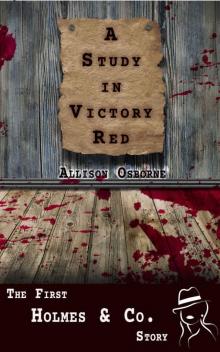 A Study in Victory Red
A Study in Victory Red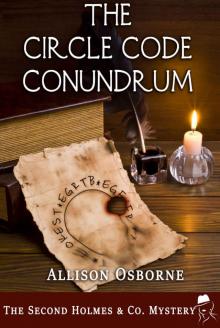 The Circle Code Conundrum
The Circle Code Conundrum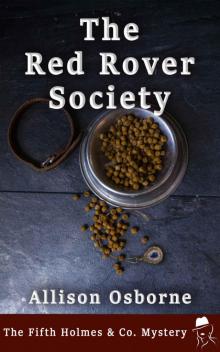 The Red Rover Society
The Red Rover Society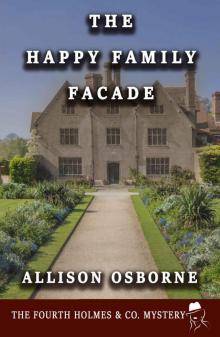 The Happy Family Facade
The Happy Family Facade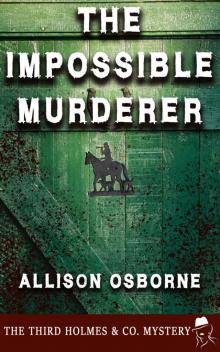 The Impossible Murderer
The Impossible Murderer